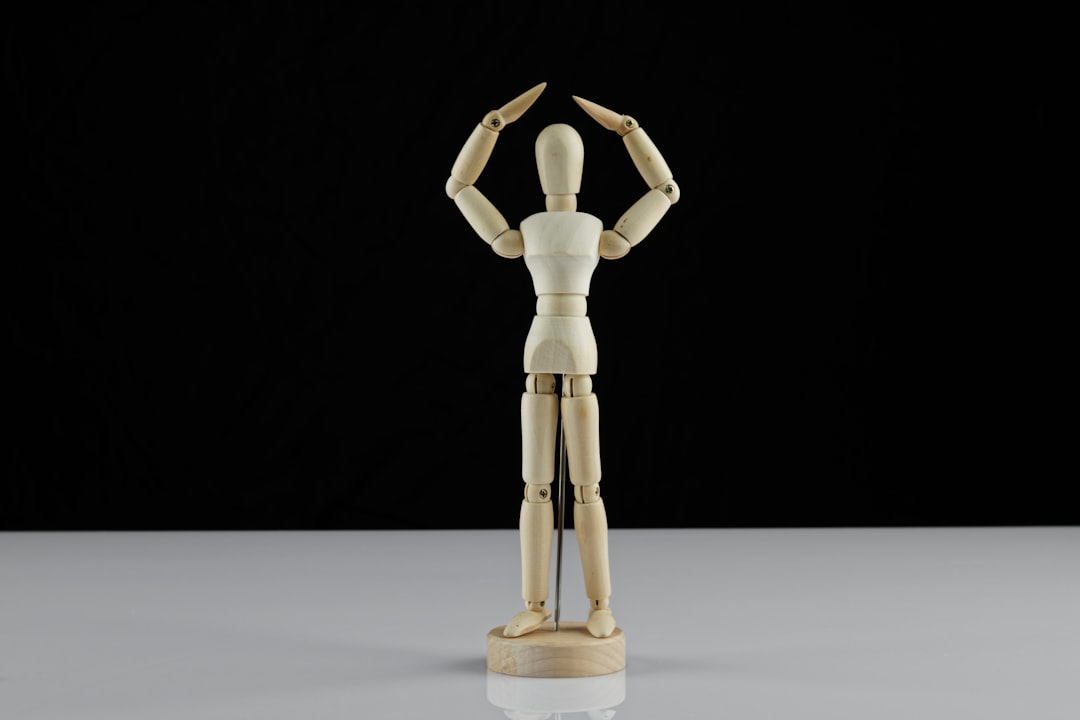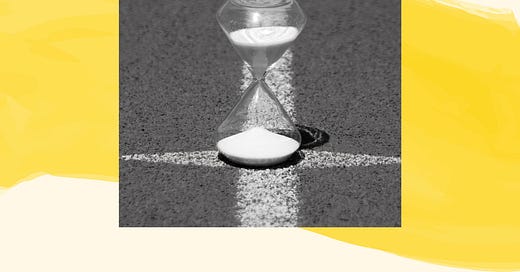Issue #22: Timelines, settling down and the fear of falling behind
Can you be late to your own life?
By the time my mother entered her thirties, she was married with two children, renovating a family home in The Wirral, a 40 minute drive from where she grew up. While the typical timeline has shifted since then – between 1991, when I was born, and 2021, the average age for a woman to have a first child increased from 27.7 to 30.9 – the format has not. In the past couple of years, I’ve watched many of my friends move out of London, get married and have children, in various rejigs of that order.
I was once on the ‘right’ timeline. I laugh to think that when I met my ex, aged 24, the same age my mother met her life partner i.e. my father, I thought I might follow in her footsteps. I laugh to think that when my ex & I broke up, shortly after my 27th birthday, and I slipped down the largest heteronormative snake on the board, my relief to be out of the ‘wrong’ relationship was almost immediately eclipsed by an urgency to find the ‘right’ one – instead, I spent the best part of five years basically-single (anyone familiar with millennial dating culture will appreciate the nuance there).
Now – statistically, or anecdotally, or both – I’m on the cusp of falling behind. Not so much in my current expat community here in Lisbon, where many actively lean in to marrying or procreating later or not at all, but certainly among my friends back home in London. And a question I have to pose to myself is: do I care?
Here’s the thing: I’m happy with my life as it is right now. I’ve identified what brings me calm (yoga, writing regularly, meditation, walking everywhere I can, good-quality food) & joy (nourishing conversations, reading, travel, love of all kinds, kindness). Sure, these are little things, but there’s a great deal it turns out I really don’t care about, or at least that I can (harder decision) do without. It’s taken the confidence and experience of reaching my thirties to separate the wheat from the chaff. Had my previous relationship worked out, I might have made some self-discoveries within it (I mean, I hope so – regardless of one’s romantic status, who wants to stay stagnant?). But, as it stands, I’ve navigated that process alone – and it’s fortified me for the coming decades.
My present happiness is heightened by a sense that this particular life stage might not last forever; that change might be on its way. Not in the form of external forces (because, to get a bit Buddhist about it, those things are outside my control), but internally: that my desires might be shifting, that I might start to want those heteronormative milestones some of my friends have, or at least to get to a place where I can decide either way.
I’ve learnt a lot these past five years. Here’s how being a ‘late-ish bloomer’ has served me:
Variety is the spice of life
You know at school, where you all buy the same style of Clarks leather shoes, so you can match? In adulthood, there’s undeniably a sense of tribal comfort that comes from continuing to do the same thing – but, equally, there’s a richness in striving to respect and acknowledge your friends for their respective life choices, and you theirs. I like hearing about lives different to mine: within a close friendship, it’s almost like trying a life on for size (more on this below). It’s also quite telling. By now, my friendships have weathered a good few years of at-odds life stages. And sure, there have been challenges – but that inconvenience (and the mutual effort both sides) has also proved that our bond is more than just a friendly situationship.
Model behaviour

While they may not realise it, the first couple in your immediate circle to ‘settle down’ (maybe this was you) carried out a generous act. Let’s put it this way: if your parents were anything like mine, they might have said to you, ‘If So-and-So put her finger in the fire, would you?’ My answer, as my peers settle down around me – leaving London, having babies, navigating married life – is, I don’t know. I’ll get back to you on that one…
Sure, we want to make life choices that are authentically our own. That are right for us, not someone else. But how can we make educated choices in the absence of models of how to live? It’s a bad idea to leap into a relationship with the wrong person just because your friends are coupled-up; but, equally, witnessing a model of a good relationship (or, at least, one that has elements that appeal to you) might inspire you to pursue one for the right reasons.
Ditto – the decision of whether or not to have children, arguably the most loaded decision you’ll ever make. Some feel a biological, visceral impulse to do so (you might suspect, rightly, that this has not kicked in for me – yet, at least), while others know deep down they don’t want children; there seems to be something useful about this certainty either way. In the state of agnosticism that I – and, apparently, many Millennials and Gen Z – face, models provide a helpful point of reference. Again, cheers to my parent mates.
You might witness what your loved ones – who, up until this point, you’ve made fairly similar life choices to – have, and begin to want this for yourself. Or you might feel more certain that you want to go in a different direction. But what you’re dealing with is real-world data, which you haven’t even had to live through first-hand yet.
Meanwhile, other people’s milestones can provide helpful nudges. In Nell Frizzell’s book The Panic Years, she describes how weddings are a necessary social ritual, because they provoke us to ask questions of our own lives (who hasn’t sat, watching a couple get married, and evaluated their current romantic state in some way, even if in a generous light?). It’s a bit like an bi-annual performance review with your boss; you probably wouldn’t instigate it yourself, but it’s useful that it happens.
The ticking clock
The passing of time, and the changes that come with it, are inevitable. Some changes are fairly painless: for instance, I have absolutely no desire to be in my twenties again. Others might seem inconvenient: for instance, the two years many of us felt we lost to the pandemic. In the wake of that time, I felt some guilt for travelling most of last year, at a time when I felt I ‘should’ have been focussed on settling down. And yet, I enjoyed that time all the more because I knew it may be one of the last years I could be so audaciously selfish and unencumbered; as a twenty-something, time might have felt less precious.
As for *that* ticking clock, I will say on behalf of all women: fuck biology, and fuck the industries (e.g. fertility clinics) that profiteer off of our fear. It’s a very personal issue, and one I by no means have any answers to, as I navigate it myself. All that one can do in the face of inevitability is face that decision-making head on: to make calculated risks, to understand what your priorities are. The small consolation is that there are more options available than ever before in history in this realm: I know solo-by-choice parents; women who have frozen their eggs; friends who intend to adopt; couples who don’t want kids at all. It’s not perfect – but it’s also not the 1800s anymore.
Overcoming the fear of being ‘left behind’
I’ve spent significant periods of the past half-decade catastrophising about ‘falling behind’ my close friends: for instance, after an influx of engagement or pregnancy announcements (they really are like buses, I’ve found).
Once, I might have glossed over these fears. Friends moving away or otherwise occupied? Make new ones! Dating woes? Live your best single life! While I’ve adopted these approaches myself, I want to acknowledge at the same time how difficult these challenges can be: feeling out of sync with your lifelong best friends, or being the anomalous ‘single one’ at a family event.
Some things I’ve realised:
Change is scary. That’s OK to acknowledge. It’s scary if you’re the one instigating, but it’s also a different flavour of scary when it’s outside of your control.
While you may predict a particular outcome, it’s impossible to tell how a life event might affect your particular friendship. As a close friend said to me, many of her friendships remain unchanged – or even stronger – since her friends became parents
Sure, there might be a phase where your friend is AWOL, but friendship is a long game
You can decide how to show up during this new phase of friendship – and resourcefulness might strengthen your friendship in a whole new way (see my piece on supporting parent friends while childfree)
Times of transition may well open the door to more friendships that serve you in different ways; more is more
You don’t have to be at the same life stage as someone in order to stay friends with them – sometimes it’s the opposite (contrary to popular belief, new parents aren’t lobotomised at the hospital and rewired to exclusively want to talk about soft play).
These revelations aren’t just coping mechanisms for now. They’re life lessons for the future, too. Because as much as it might seem like one decade’s particular set of timeline pressures lasts forever – e.g. the Marriage & Kids conundrum of one’s 30s – they will be replaced by another in the successive ones – who’s divorced/retired/living mortgage-free/empty-nesting/on their second marriage? – not to mention specific professional or cultural ones: Who’s made head of department? Whose kids got married first?
Getting perspective(s)
When it comes to models, having a cornucopia of perspectives* – rather than fixating on, say, the friendship group from school – can help you escape the mindset that you’re somehow ‘left behind’. One person I often find myself thinking of is an academic in her mid-50s whom I’ve kept up an email correspondence with over the past couple of years. Since getting divorced aged 30, she’s ‘reinvented herself’ (her words) several times, found great love (in her 30s); travelled the world and lived abroad (in her 40s); her dream job (in her 50s).
Her generous perspective is a constant reminder to me, not just that fixed timelines are an illusion, but that there are milestones to be found in each decade – and that the race can be run as a long, lovely marathon, if you like.
* The best collective noun for ‘perspectives’, according to me.
I’d love to hear from you…
Do you feel restricted by the idea of a ‘timeline’?
What are the main milestones you’re facing right now?
What’s your favourite advice on this subject?
📚 The Panic Years by Nell Frizzell
📕 Happy Ever After by Paul Dolan
🎙Adulting 2: The Timelines podcast from Oenone
🗞 This Is Me Trying newsletter from Rebecca Reid








